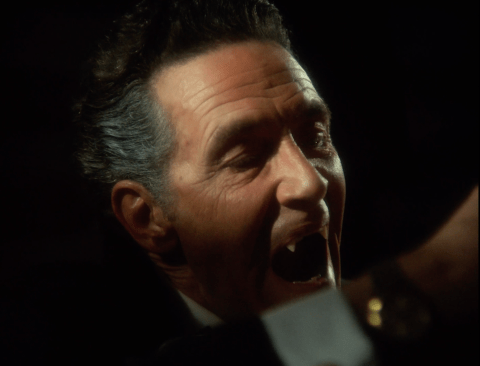Art House Meets Grindhouse in Reece's Climate of the Hunter
FTC Statement: Reviewers are frequently provided by the publisher/production company with a copy of the material being reviewed.The opinions published are solely those of the respective reviewers and may not reflect the opinions of CriticalBlast.com or its management.
As an Amazon Associate, we earn from qualifying purchases. (This is a legal requirement, as apparently some sites advertise for Amazon for free. Yes, that's sarcasm.)

The gritty, post-Vietnam period of the 1970’s made an indelible mark on horror cinema. Long gone were the gothic icons of the Universal pantheon and the B-Movie buffoonery of the Eisenhower years--a new wave of unflinching realism took hold that examined and, more often, confronted, a world numb from war and economic instability, drugs, sexual promiscuity and mistrust, and films like The Texas Chain Saw Massacre, Rabid, Martin and Blue Sunshine were awash in the decade’s heady experimental attitude.
It’s this hazy era that Vision Chaos Productions faithfully recreates in its latest release, Climate of the Hunter, a captivating, moody, slow-burn acid trip throwback that invokes the disjointed atmosphere of Jean Rollin, Jess Franco and latter-day Hammer with striking efficiency. The film opens in 1977 with the psychological case file of Alma Summers (Ginger Gilmartin), which reports that she’s a woman suffering from delusional disorders and possible schizophrenia. Following her divorce, middle-aged wood sculptor Alma had been living a solitary existence on her vacation property in the secluded backwoods accompanied only by her dog, Otis, and ultra-paranoid reefer-loving conspiracy nut neighbor B.J. (Jacob Snovel). When Alma’s sister, D.C. lawyer Elizabeth (Mary Buss), comes for a visit, the two struggle to reconnect, and their attempts at sisterly bonding are further complicated by the arrival of Wesley (Ben Hall), a writer acquaintance of the pair whose intellectual, urbane personality immediately arouses jealousies from both women. Yet Wesley may not be what he seems: his wife was recently signed into a sanitarium, he sleeps the daylight away in a candle-filled room and his own angry son, Percy (Sheridan McMichael) purposely slips garlic into Wesley’s salad dressing knowing all-too-well it’s one of his father’s fiercest allergies. When B.J. begins insinuating to Alma that Wesley may be something other than human, the hallucinogenic set pieces inspired by her increasingly hostile nightmares nudge Alma onto a violent path that may end in vampire slaying--or is it murder?
Climate Of The Hunter flouts a flawlessly envisioned art-house-meets-the-grind-house ambiance bolstered by faux-retro production values, complete with period-accurate opening credits, choppy editing and a tinted 16mm celluloid look that emulates the decade’s grainy Euro-horror stylings to such perfection, an unaware viewer may wrongfully assume it at one time played a drive-in double feature with The Night Evylen Came Out Of The Grave. The characters, too, reflect that time through word and deed--Gilmartin’s Alma rocks a Janis Joplin groove, and Hall injects Wesley with a hardy helping of Christopher Lee-inspired bravura--his deep, gravelly voice, philosophical musings and domineering personality fosters the audience’s belief that he might be an undead monstrosity more than any single action he takes.
There’s an underlying theme concerning the deterioration of the family unit running through the script by director Mickey Reece and writing partner John Selvidge, but their attempts to convey this message ultimately becomes lost amid the intentionally jarring narrative. There’s an oddity-for-oddity’s-sake peculiarity to Climate of the Hunter that overwhelms any substance with its disorderly style. Unusual storytelling devices (quick-cut interludes of what each meal consists of flash on-screen prior to every dinner scene, for instance) may reflect Alma’s fragmented mental state but it’s unclear to the viewer if they are the result of skillful cinematic craftsmanship or simply overblown exercises in aesthetic pretension. It’s Nosferatu directed by David Lynch, but in the end the weirdness dilutes any understated power the movie possess, and as Wesley admits to Percy early on, “The lack of clarity deepens the mortal shadows.”
I give Climate of the Hunter a 2.5 (out of 5) on my Fang Scale (Add a point if you love David Lynch).


